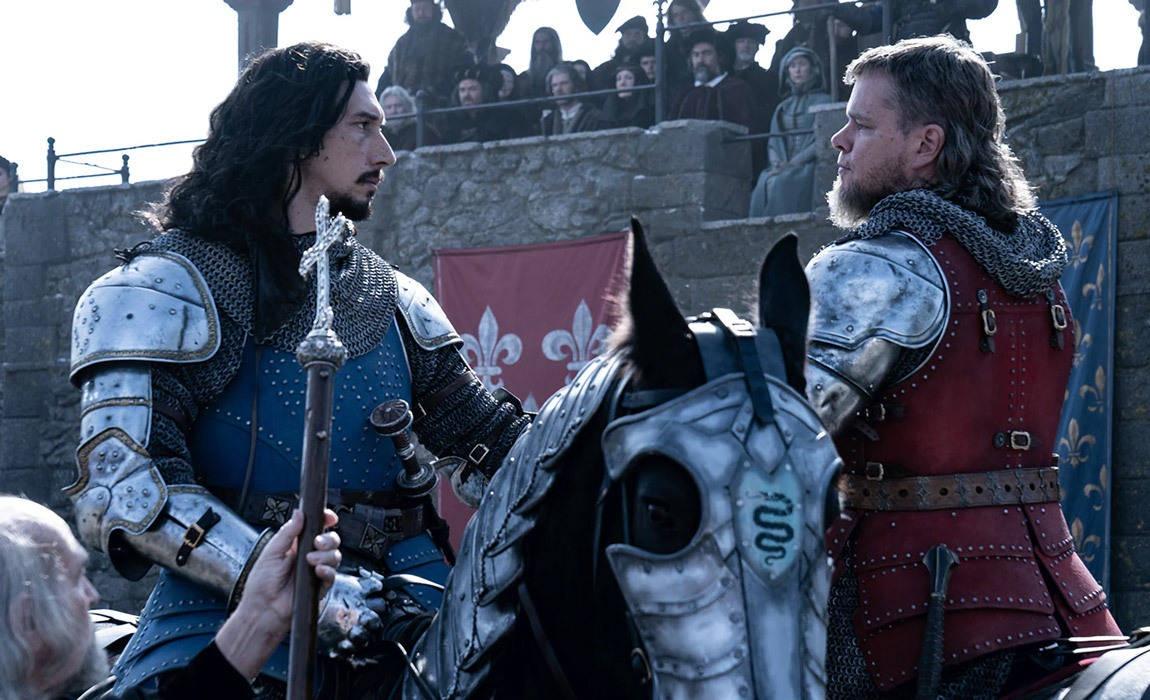The Last Duel is a thoughtful, complicated story about one of the last sanctioned trials by combat, that hits hard with poignant commentary when it is at its best, but is a boring, poorly paced slog when at its worst.
Ridley Scott is a director with a storied career, director of classics across a multitude of genres, from the science fiction-horror classic Alien, to the action-drama Gladiator. The brutal story of the heroism and tragedy of Black Hawk Down. The acclaimed buddy crime drama Thelma and Louise. Scott has even ventured down the path of historical fiction based on real events before with the oft-maligned, but redeemed in a Director’s Cut Kingdom of Heaven. So a tense historical drama based on a real medieval trial should have been a perfect fit for him.
Matt Damon as Sir Jean de Carrouges and Adam Driver as Jacques Le Gris
The Last Duel is told in three parts, essentially the same story told from the perspectives of its three principal characters. After briefly teasing the duel itself, we flash back to the story of Jean de Carrouges, a financially struggling but loyal minor lord, who returns home from campaigning against the English during the Hundred Years War to find out his wife Marguerite has been raped by a former friend of his, the well-connected nobleman, Jacques Le Gris. We see the second part from the perspective of Le Gris, and the final part from the perspective of Marguerite.
This trial, which occurred in 1386, is quite well documented, having been recorded by church officials, so like the trial of Joan of Arc, there are a wealth of primary and secondary sources including testimony from all parties. And it’s a fairly captivating story: a knight’s wife is assaulted, and he struggles against corruption, bigotry, and nepotism to avenge that wrong.
But is it so simple? And this is where The Last Duel really excels. Carrouges perceives himself as the aggrieved party, and the knight, dutiful to both his king, and to his wife. And while Marguerite is rightfully outraged herself, she has the clarity to recognize that her husband isn’t fighting this duel for her, but for himself. For the slight of Le Gris violating his wife, for the past grievances Le Gris and his patron, the Count Pierre d'Alençon, for the stain that would be left on his honor if he did not. This is a fantastic story, at its core. If only the storytelling held up.
Jodie Cormer shines with a powerful performance as Marguerite.
Probably the weakest portion of the film is the portion told from Le Gris’ perspective, which is largely unnecessary. His version of the rape has only very slight differences to how it is seen from her perception. After the fact, he recognizes that he has done wrong, and tries to justify it to himself and others with any number of the classic excuses. But these are well known, and well worn, tropes in rape stories both real and fictional that the audience will already be very familiar with. Seeing it play out in long form just isn’t necessary to the narrative. And while you might argue there’s a hard-hitting emotional resonance in seeing the rape carried out twice, honestly, with such little variation to his version versus hers, it just feels like a piece of carefully crafted audience manipulation, rather than poignant filmmaking. His version isn’t thought-provoking, it doesn’t cast events in a different light.
This film would have just played out better in a conventional format. Tell the story once, and perhaps revisit some scenes later as brief flashbacks, or as strong dialog. You could cut half an hour off of the run time most likely, focusing on the key events, and then revealing the differences in how events were perceived later. It also feels like the story felt the need to punch up the narrative with battle scenes from Carrouges’ campaigns, but in the end, they’re quickly forgotten, and of little consequence to the story. As a result, the first third of the movie is very slow to get going, and the stakes so slowly raised that by the time we get to the scene where Marguerite reveals her rape to her husband, the movie feels like it should be moving into its Third Act. Instead, it resets back to the start with Le Gris’ slightly different interpretation of the battle that opened Carrouges’ story.
This isn’t a bad film by any means. Many of the hallmarks of Ridley Scott’s best works are here, and the performances by Jodie Cormer, Adam Driver, and Matt Damon are fantastic. The Last Duel is quite good when it is good. But there’s so much padding to the run time that this movie should have left on the cutting room floor.
I don’t recommend seeing a late showing. I give this a B-
